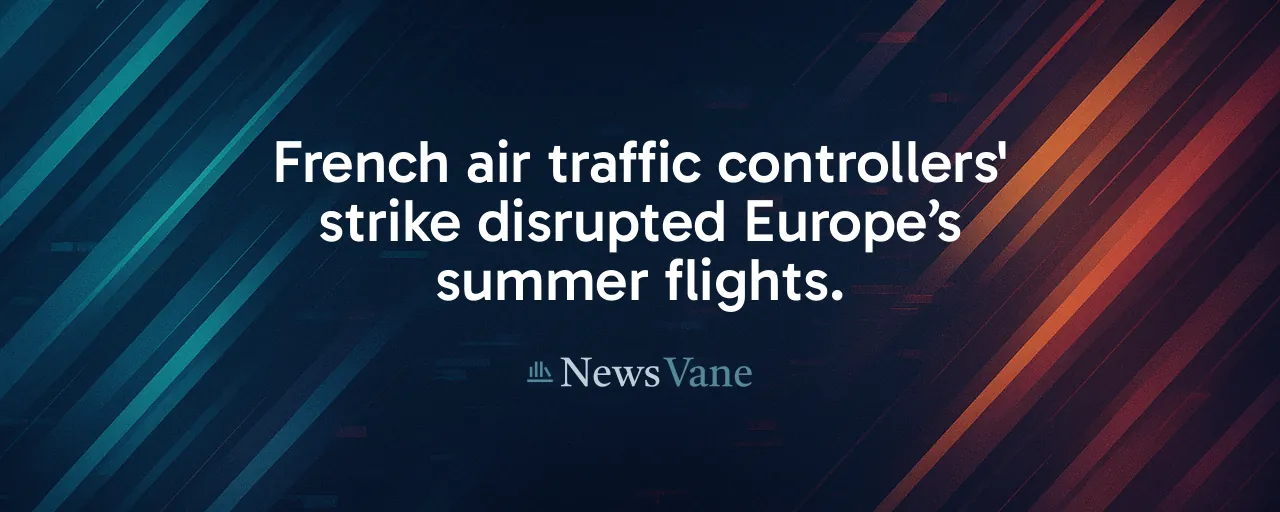Flights Grounded, Plans Upended
A two-day walkout by French air traffic controllers, starting July 3, 2025, threw Europe's summer travel season into chaos. Hundreds of flights vanished from schedules, leaving tens of thousands of passengers stranded. Airports in Paris, Nice, and Marseille saw sharp cuts, with Ryanair alone scrapping 170 flights and easyJet slashing 274. The ripple effect hit travelers far beyond France, as the country's airspace serves as a critical corridor for intra-European routes.
The strike, led by unions like UNSA-ICNA and USAC-CGT, highlighted a deeper tension. Controllers demand better staffing and working conditions, while airlines and passengers bear the brunt of disrupted plans. This clash raises a pressing question: how can Europe protect workers' rights without paralyzing its skies?
Why Controllers Walked Out
At the heart of the strike lies a struggle over resources and respect. French controllers, numbering about 1,400, say chronic understaffing forces them into grueling overtime. Roughly 270 joined the walkout, citing workload, outdated equipment, and strained management relations. Their grievances aren't new; prior agreements to hire more staff and upgrade technology have repeatedly stalled.
The DGAC, France's aviation authority, faces a tough balancing act. Its role is to ensure safety and capacity while navigating labor demands. Meanwhile, airlines argue the stoppage's timing, at the peak of summer, maximizes disruption. Eurocontrol reported over 900 cancellations on the first day, with delays clogging the continent's aviation network.
A Costly Pattern
French controllers have grounded flights repeatedly. Strikes in 2018-2022 cost airlines and related industries an estimated €800 million, racking up 3.7 million minutes of delays. Rerouting flights around closed airspace spikes fuel costs and CO₂ emissions, adding environmental strain. For passengers, the toll is personal: missed holidays, derailed business trips, and unexpected expenses.
Historical efforts to curb disruptions, like a 48-hour strike-notice law, improved predictability but didn't solve capacity issues. The EU's Single European Sky initiative, meant to streamline air navigation, has dragged on for years, slowed by national interests and labor complexities. Each strike underscores the same unresolved gaps.
The Stakes for Europe's Skies
The economic fallout is steep. Airlines face surging fuel and crew costs, while tourism-heavy regions lose vital summer revenue. Beyond money, the social impact stings: holidaymakers miss long-planned trips, and workers traveling home face delays. Controllers, too, report burnout, with fatigue threatening safety margins.
Legally, the issue is thorny. The right to strike is protected under French and EU law, but so is the free movement of people and goods. Any move to limit strikes needs to respect collective bargaining while addressing the network-wide havoc. The debate extends beyond one country; it concerns Europe's interconnected aviation system.
Finding Common Ground
Solutions exist, but they require compromise. Research points to understaffing and slow modernization as root causes. A multi-year hiring plan could ease pressure on controllers, while accelerated funding for digital tools, like remote towers, could boost efficiency. Transparent minimum-service rules during strikes might protect key flights without undermining labor rights.
Cross-border coordination offers another path. Neighboring countries like Spain and Germany absorb overflow traffic during French strikes, but this strains their systems. Harmonized contingency plans, backed by EU investment, could spread the load more evenly. An independent mediation body to resolve disputes before peak seasons might also prevent escalations.
A Connected Future
The latest strike is a wake-up call for France and all of Europe. Balancing worker protections with seamless travel demands bold, collaborative action. Investments in people and technology, paired with clear rules, could stabilize the system while respecting rights on both sides.
Passengers, airlines, and controllers all want the same thing: a reliable, safe aviation network. Achieving it means tackling tough questions about priorities and resources. The path ahead lies in dialogue and innovation, ensuring Europe's skies remain open for everyone.
As summer travelers regroup, the bigger challenge looms. Will Europe seize this moment to rethink its airspace management, or will the cycle of strikes and delays persist? The answer depends on finding a balance that works for all.
